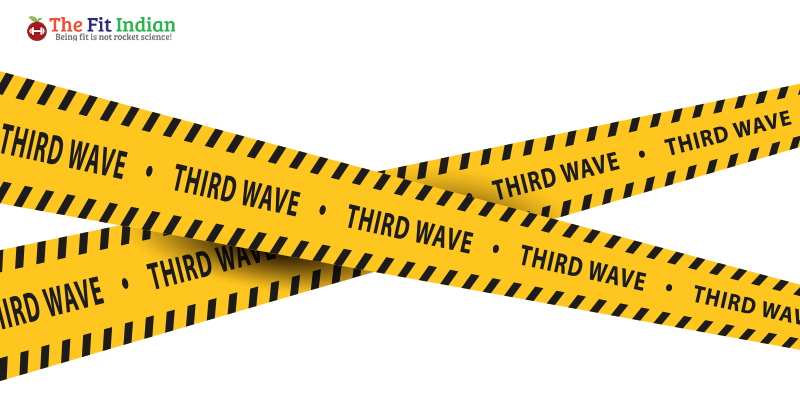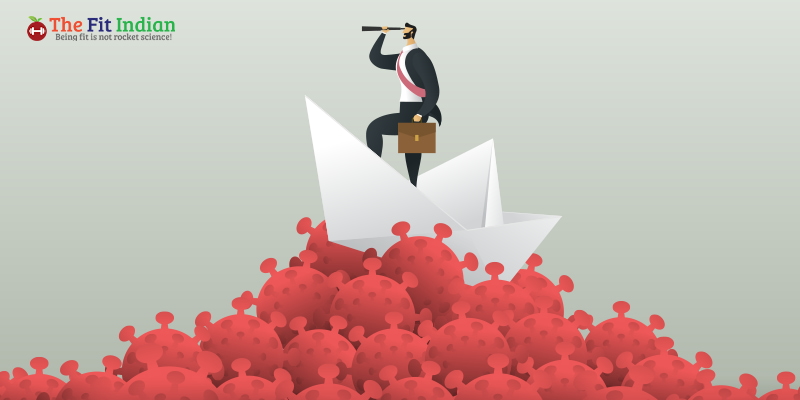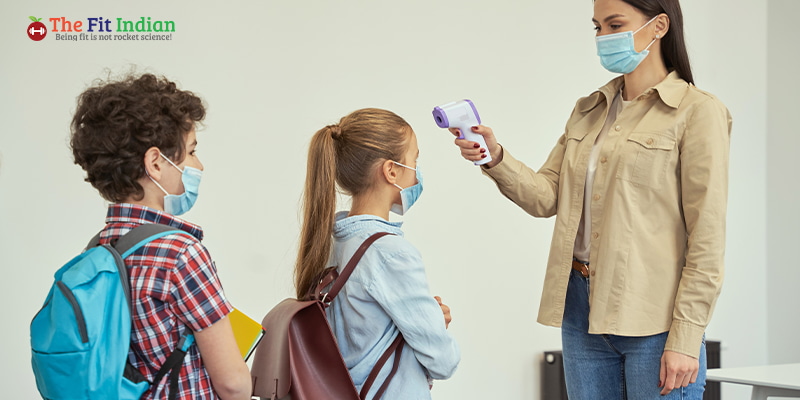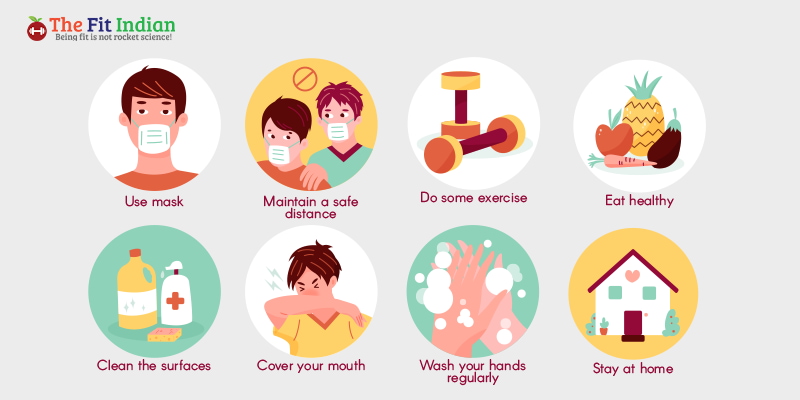COVID-19 Third Wave – How to Protect Yourself During the Outbreak
Reviewed by: Dr. T S Deepthi Sarojini | Author: Manoja Kalakanti
As the world is still reeling under the devastating effects of the first two waves of COVID-19, there are alarming signs that a third wave might soon strike. The vaccinations have rolled out, nations are going back to normalcy, economies are being revived, yet the coronavirus pandemic is still a threat that looms over us with no sign of abetting anytime soon. But it is the news of a COVID-19 third wave that has become a cause of concern for healthcare workers and governments worldwide.

The Delta variant, a highly contagious COVID-19 strain that was first identified in India, has now spread around the world from Asia to the United States. It has wreaked havoc across Asian countries such as Iran, the Philippines, and Indonesia. The world is yet to recover from the effects of this variant, as the threat of a third wave looms on the horizon. India, which has faced the brunt of the coronavirus, is gearing up to face the impending new wave of COVID-19. Is the threat of the third wave real? Let’s find out!
The Threat of the Third Wave of COVID-19
But will there be a third wave? Is there any concrete proof or evidence that suggests the same? The Lancet Covid-19 Commission India Task Force report talks about the high probability of the third wave in October. In its report, it claims that we may witness as much as 6 lakh cases per day! It also adds that children will be affected in the third wave; however, the severity of symptoms and the likelihood of mortality will remain low.
Source The report states that although there is no evidence suggesting the Delta variant will drive this wave, it remains a cause of concern. The only method to prevent an explosion of cases and a national crisis is for India to speed up its vaccination drive. But why is it widely believed that the COVID-19 3rd wave in India will be more severe and affect children? Find the reasons below.
The report states that although there is no evidence suggesting the Delta variant will drive this wave, it remains a cause of concern. The only method to prevent an explosion of cases and a national crisis is for India to speed up its vaccination drive. But why is it widely believed that the COVID-19 3rd wave in India will be more severe and affect children? Find the reasons below.
Will it be More Severe? Are Children at a Greater Risk?
All the statistics from the onset of the pandemic to the second wave point towards the severity of the subsequent wave. So, following this trend, the third wave will be more severe.
The National Institute of Disaster Management (NIDM) has warned that the vaccination drive in India is moving at a slow pace, and this could mean a massive spike in infection when the third wave hits. It also believes that the threat is imminent, and the third wave of corona will be more severe than before. But will children be at greater risk?
The Impact of the Third Wave on Children
One of the defining characteristics of the first two waves of coronavirus diseases has been its low impact on children compared to adults. But things might take a turn for the worse with the arrival of the third wave.
Based on the warning by the National Institute of Disaster Management (NIDM) in India, the healthcare system has been advised to take precautionary steps to ensure the safety of adults and children. So, why is the third wave of COVID-19 dangerous for a child? This risk has been mostly attributed to the Delta variant. There is still no conclusive evidence that suggests the probability of children being impacted. But since people below the age of 18 are not vaccinated, a strong strain in the future could cause a massive risk of infection in this group. Just as in adults, pre-existing health conditions in children could result in severe symptoms and even death. Children and adolescents with obesity and diabetes would be at a greater risk of developing such symptoms. The mortality rate among children with underlying conditions such as obesity is usually higher. This underlines the importance of putting stress on the dietary habits of children.
Just as in adults, pre-existing health conditions in children could result in severe symptoms and even death. Children and adolescents with obesity and diabetes would be at a greater risk of developing such symptoms. The mortality rate among children with underlying conditions such as obesity is usually higher. This underlines the importance of putting stress on the dietary habits of children.
By keeping your child’s weight under control and providing them with a healthy diet, you can reduce the risk of severe symptoms and strengthen their immune system.
Parents need counseling to deal with the situation better. For a proper diet plan, you can consult with a nutritionist. But you can always prevent the infection from happening in the first place. Read on to find out how!
Preventive Methods to Avoid a Third Wave of the Coronavirus
Understanding the importance of prevention when it comes to any medical conditions, especially coronavirus disease, is no rocket science. To this day, prevention remains the best choice when it comes to COVID-19. As medical experts have predicted a third wave to hit India by the end of the year, it is crucial that you take preventive measures to avoid infection.  These measures will not only keep you healthy but also protect your children, who may be at a greater risk of contracting the infection than ever before. So, how to prevent COVID-19 third wave in India? The best way to ensure that you keep your child and yourself safe is to get vaccinated. And follow these other general preventive measures:
These measures will not only keep you healthy but also protect your children, who may be at a greater risk of contracting the infection than ever before. So, how to prevent COVID-19 third wave in India? The best way to ensure that you keep your child and yourself safe is to get vaccinated. And follow these other general preventive measures:
- Maintain social distancing and do not let your child be in a crowded place
- Wear a mask and ensure your child wears one too when outside home
- Sanitize any surface that you or your child comes into contact with
- Wash and sanitize your hands regularly. Ask your child to follow the habit
- Ask your child not to touch their face with unwashed hands. Follow the same rule
- Stay at home as much as possible and go out only when it is necessary
- Exercise and eat healthy. Provide your child with nutritious food and regular exercise
Continue taking the same precautions you have been taking until recently and ensure that you get vaccinated as early as possible. Stay home, stay safe, and keep your children safe.
Bottomline
There is a long way to go before the vaccination drives cover most of the population. Until then, there is a risk of new variants of the virus hitting the population just like the Delta variant. And the longer the virus lingers, the higher will be the risks of new waves. The best way to protect yourself is to get vaccinated and control the spread of the disease through various preventive measures. It is more important than ever because the new wave of coronavirus could affect children more than ever. So, take the necessary precautions and get yourself vaccinated to reduce the impact of the next wave if and when it hits.
FAQ’s
1. Is the third wave of COVID-19 coming to India?
The third wave of COVID-19 has not hit India yet, but some experts believe it will be by October this year. The country is already witnessing the rise in the second wave started by the Delta variant.
2. What is the R factor in COVID-19?
The R number is the average number of individuals infected by one infected person during the whole period that the person was infected. Thus, the R number determines the disease’s ability to spread and also its growth rate.
3. What are some of the most common symptoms of coronavirus disease?
Some of the most common symptoms of coronavirus disease are fever, dry cough, tiredness, aches, loss of smell or taste, and diarrhoea. Some severe symptoms are difficulty breathing or shortness of breath, and pain or pressure in the chest.
4. What are some ways to prevent the spread of COVID-19?
Some of the most effective ways to prevent the spread of the coronavirus are: getting vaccinated, maintaining social distance, wearing a mask, washing and sanitizing hands and surfaces that you come in contact with, avoiding touching your face and taking necessary precautions once infected.
5. Is the Pfizer COVID-19 vaccine available in India?
The Pfizer vaccine is not yet available in India. But it might be shipped soon by the U.S.
6. Has anyone gotten COVID-19 after being fully vaccinated?
A small number of fully vaccinated people have been infected by COVID-19 even after being fully vaccinated. These are called “breakthrough cases”. But the impact will mostly be much less severe as the patients usually recover easily, thus proving the efficacy of the vaccines.
7. What are the chances of getting COVID-19 after the vaccine?
The first vaccine provides partial protection, and the second gives maximum protection. So, it is important to complete the doses. It might take up to 2-3 weeks for building maximum protection against COVID-19 after vaccination.
8. Can we exercise after receiving the COVID-19 vaccine?
There are no known risks of exercising after the vaccination. However, it may worsen symptoms such as tiredness or fatigue post-vaccination.
9. How long will it take to build immunity after getting the COVID-19 vaccine?
The first vaccine provides partial protection, and the second gives maximum protection. So, it is important to complete the doses. It might take up to 2-3 weeks for building maximum protection against COVID-19 after vaccination.
10. Should I get vaccinated after having COVID-19?
Getting vaccinated is crucial for your health and those around you, whether the coronavirus has infected you or not. COVID-19 vaccine provides maximum protection against the virus.




Manoja Kalakanti